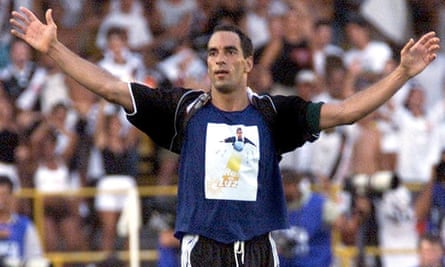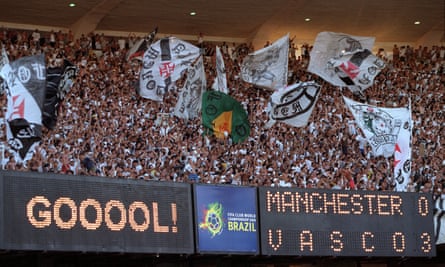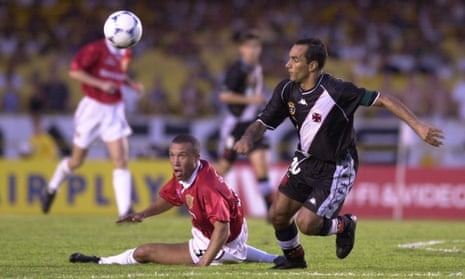For 43 minutes, Manchester United had toiled in the sweltering heat of the Maracanã, producing one of the worst performances of the Sir Alex Ferguson era. Gary Neville had been especially calamitous, furiously sweeping at the sweat-sodden curtains on his forehead having teed up one of Brazil’s greatest goalscorers, Romario, twice.
Vasco da Gama were cruising to half-time when they delivered the goal that encapsulated the European champions’ humiliating jaunt to Brazil. By the time Edmundo’s brilliant spin and finish was done, three United players lay beaten on the floor as Vasco’s showman peeled away celebrating with his shirt over his head.
O Animal
Edmundo was supremely talented, a player who combined moments of breathtaking skill with an elbows-out aggressive style that made him horrible to play against. He was a brilliant dribbler with an inventive streak, and would attempt outrageous tricks such as the Pelé runaround for which fans loved him, even if it would infuriate his team-mates. He was affectionately nicknamed O Animal – the beast, a force of nature.
But he was also thin-skinned with a ferocious temper and prone to bouts of uncontainable rage. He loved to drink and party late into the night, particularly in his hometown of Rio. Edmundo’s unpredictability on the field could be enthralling but his unpredictability off it kept derailing his career.
One of the most revealing stories about Edmundo is how he came to be back at Vasco, his boyhood club, six months before the Club World Championship. In February 1999, Fiorentina were in the running for their first Serie A title in 30 years, led by the formidable strike partnership of Gabriel Batistuta and Edmundo, when the Argentinian picked up a knee injury that would rule him out for two months.
Fans were despondent but in Edmundo they still carried great hope. The Brazilian, however, had made other plans and decided to fly home, leaving his team-mates to fight for the Scudetto without either of their star strikers. He was pictured days later partying at the Rio Carnival, and claimed he had explicitly put a clause in his contract so as not to miss it.
Although he played brilliantly on his return from Rio, it was too late. Milan won the title and Edmundo departed Fiorentina, his relationship with the club’s hierarchy irrevocably damaged. It was one of a string of fall-outs and misdemeanours that had pushed Edmundo from club to club. His most prolific early goalscoring came at Palmeiras where he won the Brazilian title, but he also received a six-week ban for attacking a match official, punched a team-mate during a training session, and was finally sacked when he demanded the stadium’s grass be cut.
Then there was the brawl that prompted his departure from Corinthians, the racial abuse of a referee during a TV interview, and the time he was detained for three days in Ecuador for kicking a cameraman after missing a penalty.
In 1997 he was excluded from the Brazil team after punching an opponent in the face during the Copa América final. Leading up to the 1998 World Cup the national manager Mario Zagallo was asked if he would reconsider Edmundo, who had recently scored six goals in one game during his second spell at Vasco. “Edmundo can score six, 60 or 600 goals in a single game, but I’ll not be calling him into the Brazilian side. In just one moment he can ruin everything. If he were to get himself sent off in the World Cup final for hitting an opponent, the press would murder me.” In the end Zagallo did take Edmundo to France, but barely used him.
Some of Edmundo’s troubles were more serious. He was sacked by Flamengo after he was involved in a car accident following a night out in which three people died. He was initially sentenced to four and a half years in prison before he appealed, and the sentence was ultimately suspended.
Three months before the Club World Championship, Edmundo was photographed during his son’s birthday party helping a circus chimp named Pedrinho drink a glass of beer. Animal rights activists criticised him and the government’s environment agency threatened to fine him. By the time he came to face Manchester United, the nickname O Animal had taken on a new meaning.

Damned either way
A common perception was that United’s withdrawal from the FA Cup to play in the 2000 Club World Championship was a disrespectful snub of the world’s oldest knockout competition. In reality, United’s position was far more difficult than it seemed.
Ferguson did not want to pull out of the Cup – he even called the prime minister, Tony Blair, in the hope he might intervene. But United were under pressure from the organisers of England’s bid to host the 2006 World Cup, and felt obliged to represent English football at Fifa’s shiny new global showpiece. Ferguson later said the club were made to feel it was a patriotic duty they could not shirk.
United knew pulling out of the FA Cup would draw criticism from the media, but turning down Fifa’s offer to play in Brazil was politically awkward. The club faced a PR blow whichever tournament they rejected, but hoped that a good showing in Brazil and the opportunity to be crowned world champions could placate the critics, while giving England’s 2006 World Cup bid the final push over the line.
The tournament did not start well. United faced the unfancied Mexican side Necaxa in the opening game of the group in a near-empty Maracanã (Fifa’s website reports an attendance of 50,000; it was barely 8,000). An entertaining match ended in a draw, and David Beckham was sent off for planting his studs in the midfielder José Milián’s thigh. It was a disappointing result but the game did at least spark some much-needed life into the tournament.
Edmundo had been a doubt leading up to group’s defining match between United and Vasco after picking up a thigh strain on a night out, but the striker recovered and led his side out into the baking hot Maracanã, and this time the stadium was brimming.
Vasco started well but their opener owed plenty to Neville’s intervention. On 24 minutes the right-back played the most casual of backpasses into Edmundo’s path, who flicked the ball sideways for Romario to slot home. It was an uncharacteristic blunder by Neville, yet two minutes later he surpassed it while attempting the rarely seen 20-yard chested backpass. Romario pounced on the loose ball to make it 2-0 and the stadium erupted again.

Neville’s ineptitude may have stood out but United were struggling all over the pitch. The champions of Europe appeared totally lost, floundering in the 35-degree heat and unable to adapt to their opponents’ style of play, all flicks and tricks and unpredictable movement – which Edmundo then encapsulated in one sweeping motion.
Juninho scooped an extravagant pass across United’s half to where the left-back Gilberto was arriving. Edmundo showed for the ball to his feet on the edge of the box with his back to goal, and Gilberto slid in a low, fast pass. Aware of Mikaël Silvestre closing in behind him, Edmundo let the ball roll on to his planted right foot before flicking it with an audacious stab of his boot over the defender, who fell to the floor perplexed as the Brazilian spun and gave chase.
Then it was a foot race: Mark Bosnich sprinted from his line as Jaap Stam charged across the area, but Edmundo was quicker and more determined than both. He launched himself into the challenge, chipping the ball over the sliding Bosnich and into the net before they all crashed together. Edmundo sprang up, leaving a trail of mesmerised United players behind him, and celebrated by lifting his shirt over his head to reveal a picture of his son.
Romario’s opening two goals were foolish concessions on United’s part, but this time there was little they could do. Their faces said they had never seen anyone like Edmundo before, and they probably hadn’t; most of the players had never played in Brazil and later admitted theyhad seen no footage of their opponents in preparation. “Only geniuses can do what Edmundo did to me for his goal,” Silvestre later reflected. The English and European champions had left their comfort zone and been brought to their knees by O Animal.
United scored a late goal through Nicky Butt but lost the game 3-1. At least it was the lowest point of their season: their title challengers, Leeds United and Arsenal, dropped points slogging it out in the January cold and mud, while the champions recuperated with walks on the Rio sand. They returned to Manchester refreshed and romped to the title by 18 points.
For Edmundo, his goal was undoubtedly the high point of his third spell at Vasco. Days after beating United they faced fellow Brazilian side Corinthians in the final and Edmundo missed the decisive penalty in a shootout, something he later described as the worst moment of his career.
His relationship with Romario quickly deteriorated and hit a rock bottom a couple of months later in a dispute over the club captaincy. Edmundo soon left Vasco for Santos. “They say his dream is to play alongside me in the national team,” said Romario. “My dream is to never play with him again.”
Edmundo went on to Napoli, Tokyo and six other clubs, and twice more he returned to Vasco at the end of his career – the club where it all started, where it all finished, and in whose famous black and white he had scored one of his greatest goals.

Comments (…)
Sign in or create your Guardian account to join the discussion